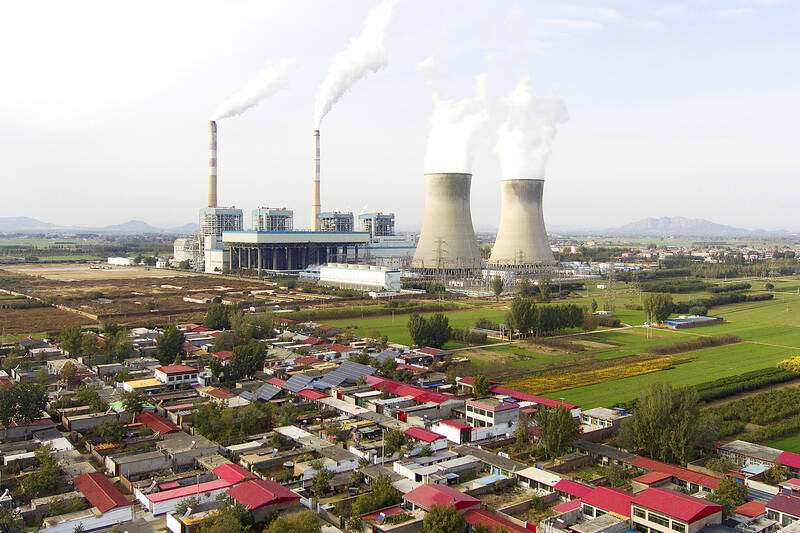China’s power industry began construction on nearly 100 gigawatts of new coal plant capacity last year, the most in nearly a decade, a report from two clean-energy groups said yesterday.
The development raises concerns about the country’s ability to meet its carbon reduction goals and threatens to undercut China’s massive expansion in solar and wind power, which has far outpaced that in the US and Europe, the report said.
“Instead of replacing coal, clean energy is being layered on top of an entrenched reliance on fossil fuels,” it said.

Photo: AP
The report is part of a review of China’s coal projects done every six months by the Europe-based Centre for Research on Energy and Clean Air and the US-based Global Energy Monitor.
Construction began on 94.5 gigawatts of coal power plant capacity last year, more than in any year since 2015, according to a worldwide database of coal plants maintained by Global Energy Monitor.
Work also resumed on 3.3 gigawatts of suspended projects, the report said.
“A substantial number of new plants will come online in the next 2-3 years, further solidifying coal’s role in the power system,” it said.
The concern is that coal power would displace solar and wind capacity. The report said that in the last three months of last year, electricity generation from fossil fuels remained high, while solar and wind use dropped sharply.
Chinese President Xi Jinping (習近平) announced two climate goals in 2020 — a peak in carbon emissions by 2030 and reaching carbon neutrality by 2060.
China’s carbon emissions might have already peaked and the next challenge is to begin reducing them, analysts have said.
The report from the clean energy groups said that China accounted for 93 percent of construction starts globally for coal power plants last year.
Proposals for new or revived coal plant projects in China fell last year to 68.9 gigawatts from more than 100 gigawatts the two previous years, suggesting that construction starts could slow, report said.

Asian perspectives of the US have shifted from a country once perceived as a force of “moral legitimacy” to something akin to “a landlord seeking rent,” Singaporean Minister for Defence Ng Eng Hen (黃永宏) said on the sidelines of an international security meeting. Ng said in a round-table discussion at the Munich Security Conference in Germany that assumptions undertaken in the years after the end of World War II have fundamentally changed. One example is that from the time of former US president John F. Kennedy’s inaugural address more than 60 years ago, the image of the US was of a country

BLIND COST CUTTING: A DOGE push to lay off 2,000 energy department workers resulted in hundreds of staff at a nuclear security agency being fired — then ‘unfired’ US President Donald Trump’s administration has halted the firings of hundreds of federal employees who were tasked with working on the nation’s nuclear weapons programs, in an about-face that has left workers confused and experts cautioning that the Department of Government Efficiency’s (DOGE’s) blind cost cutting would put communities at risk. Three US officials who spoke to The Associated Press said up to 350 employees at the National Nuclear Security Administration (NNSA) were abruptly laid off late on Thursday, with some losing access to e-mail before they’d learned they were fired, only to try to enter their offices on Friday morning

STEADFAST DART: The six-week exercise, which involves about 10,000 troops from nine nations, focuses on rapid deployment scenarios and multidomain operations NATO is testing its ability to rapidly deploy across eastern Europe — without direct US assistance — as Washington shifts its approach toward European defense and the war in Ukraine. The six-week Steadfast Dart 2025 exercises across Bulgaria, Romania and Greece are taking place as Russia’s invasion of Ukraine approaches the three-year mark. They involve about 10,000 troops from nine nations and represent the largest NATO operation planned this year. The US absence from the exercises comes as European nations scramble to build greater military self-sufficiency over their concerns about the commitment of US President Donald Trump’s administration to common defense and

Cook Islands officials yesterday said they had discussed seabed minerals research with China as the small Pacific island mulls deep-sea mining of its waters. The self-governing country of 17,000 people — a former colony of close partner New Zealand — has licensed three companies to explore the seabed for nodules rich in metals such as nickel and cobalt, which are used in electric vehicle (EV) batteries. Despite issuing the five-year exploration licenses in 2022, the Cook Islands government said it would not decide whether to harvest the potato-sized nodules until it has assessed environmental and other impacts. Cook Islands Prime Minister Mark Brown